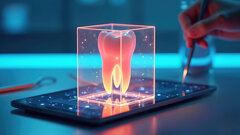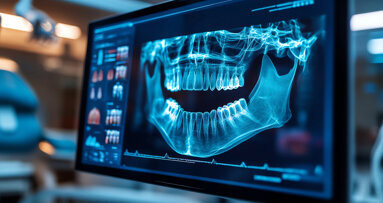WASHINGTON, US: While the links between oral and systemic health are well established and widely discussed in the dental literature, the broader relationship between oral health and overall quality of life—beyond clinical function and symptoms—has received comparatively less emphasis, and there is growing interest in this area. According to new findings from the Gallup National Health and Well-Being Index, adults in the US who visit a dentist at least once a year report significantly better health and well-being than those who do not.
The data, gathered from nearly 12,000 adults surveyed between November 2024 and February 2025, underscores the vital role oral health plays in overall quality of life. Forty-two per cent of adults who had a dental visit in the past 12 months rated their health as “excellent” or “very good”, compared with just 26% of those who had not. This association extended beyond self-rated health, influencing key indicators such as daily energy, productivity and life satisfaction.
While annual household income remains the strongest predictor of whether someone visits the dentist—only 46% of adults earning under US$24,000 (€22,882*) do so, versus 86% of those earning US$180,000 or more—the benefits of dental visits hold across all income brackets. Even in lower-income groups, those who see a dentist report better health and well-being than their counterparts who do not.
The study also highlights several barriers to dental care. Adults without a personal doctor, health insurance or enough food are significantly less likely to have had a recent dental visit. Smokers and individuals facing mental health challenges, such as loneliness or lack of social support, are similarly less likely to seek care. The researchers noted that the relationship is likely bidirectional: poor oral health may negatively affect self-esteem and mental health, and social and emotional challenges can reduce motivation for self-care, including dental hygiene.
The findings present a call to action for community leaders and dental professionals. Expanding access to affordable or pro bono dental care in low-income areas could not only improve oral health, but also support broader health and well-being.
Considering that 71% of US adults reported a dental visit in the past year, the study findings reinforce the critical message that maintaining regular oral care is not just about teeth; it is a foundation for a healthier, more fulfilling life. The study confirms something about which dentistry is now becoming increasingly aware, namely, that the benefits of maintaining good oral health extend to the entirety of an individual’s physical and psychological well-being.
Editorial note:
* Calculated on the OANDA platform for 26 November 2024.
Topics:
Tags:
In medicine, it is widely accepted that medical implants and treatments require revision over time. In orthopaedic surgery, for example, joint replacements ...
NEW YORK, US: Oral diseases and depression are both projected to rise in prevalence over the coming decades, and recent findings suggest the two may be ...
MALMÖ, Sweden: A forward thinking, transdisciplinary oral health research hub at Malmö University has received a welcome funding injection from ...
STONY BROOK, N.Y., US: The applicability and efficacy of artificial intelligence (AI) within dentistry appears to be limitless. With each passing day, ...
ŌTSU, Japan: The links between diabetes, obesity and periodontal disease are well established; however, most studies on their associations have had sample ...
Live webinar
Tue. 24 February 2026
1:00 pm EST (New York)
Prof. Dr. Markus B. Hürzeler
Live webinar
Tue. 24 February 2026
3:00 pm EST (New York)
Prof. Dr. Marcel A. Wainwright DDS, PhD
Live webinar
Wed. 25 February 2026
11:00 am EST (New York)
Prof. Dr. Daniel Edelhoff
Live webinar
Wed. 25 February 2026
1:00 pm EST (New York)
Live webinar
Wed. 25 February 2026
8:00 pm EST (New York)
Live webinar
Tue. 3 March 2026
11:00 am EST (New York)
Dr. Omar Lugo Cirujano Maxilofacial
Live webinar
Tue. 3 March 2026
8:00 pm EST (New York)
Dr. Vasiliki Maseli DDS, MS, EdM



 Austria / Österreich
Austria / Österreich
 Bosnia and Herzegovina / Босна и Херцеговина
Bosnia and Herzegovina / Босна и Херцеговина
 Bulgaria / България
Bulgaria / България
 Croatia / Hrvatska
Croatia / Hrvatska
 Czech Republic & Slovakia / Česká republika & Slovensko
Czech Republic & Slovakia / Česká republika & Slovensko
 France / France
France / France
 Germany / Deutschland
Germany / Deutschland
 Greece / ΕΛΛΑΔΑ
Greece / ΕΛΛΑΔΑ
 Hungary / Hungary
Hungary / Hungary
 Italy / Italia
Italy / Italia
 Netherlands / Nederland
Netherlands / Nederland
 Nordic / Nordic
Nordic / Nordic
 Poland / Polska
Poland / Polska
 Portugal / Portugal
Portugal / Portugal
 Romania & Moldova / România & Moldova
Romania & Moldova / România & Moldova
 Slovenia / Slovenija
Slovenia / Slovenija
 Serbia & Montenegro / Србија и Црна Гора
Serbia & Montenegro / Србија и Црна Гора
 Spain / España
Spain / España
 Switzerland / Schweiz
Switzerland / Schweiz
 Turkey / Türkiye
Turkey / Türkiye
 UK & Ireland / UK & Ireland
UK & Ireland / UK & Ireland
 Brazil / Brasil
Brazil / Brasil
 Canada / Canada
Canada / Canada
 Latin America / Latinoamérica
Latin America / Latinoamérica
 USA / USA
USA / USA
 China / 中国
China / 中国
 India / भारत गणराज्य
India / भारत गणराज्य
 Pakistan / Pākistān
Pakistan / Pākistān
 Vietnam / Việt Nam
Vietnam / Việt Nam
 ASEAN / ASEAN
ASEAN / ASEAN
 Israel / מְדִינַת יִשְׂרָאֵל
Israel / מְדִינַת יִשְׂרָאֵל
 Algeria, Morocco & Tunisia / الجزائر والمغرب وتونس
Algeria, Morocco & Tunisia / الجزائر والمغرب وتونس
 Middle East / Middle East
Middle East / Middle East







































To post a reply please login or register